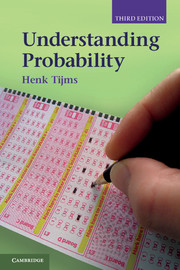Book contents
- Frontmatter
- Contents
- Preface
- Introduction
- PART ONE PROBABILITY IN ACTION
- PART TWO ESSENTIALS OF PROBABILITY
- 7 Foundations of probability theory
- 8 Conditional probability and Bayes
- 9 Basic rules for discrete random variables
- 10 Continuous random variables
- 11 Jointly distributed random variables
- 12 Multivariate normal distribution
- 13 Conditioning by random variables
- 14 Generating functions
- 15 Discrete-time Markov chains
- 16 Continuous-time Markov chains
- Appendix: Counting methods and ex
- Recommended reading
- Answers to odd-numbered problems
- Bibliography
- Index
14 - Generating functions
Published online by Cambridge University Press: 05 August 2012
- Frontmatter
- Contents
- Preface
- Introduction
- PART ONE PROBABILITY IN ACTION
- PART TWO ESSENTIALS OF PROBABILITY
- 7 Foundations of probability theory
- 8 Conditional probability and Bayes
- 9 Basic rules for discrete random variables
- 10 Continuous random variables
- 11 Jointly distributed random variables
- 12 Multivariate normal distribution
- 13 Conditioning by random variables
- 14 Generating functions
- 15 Discrete-time Markov chains
- 16 Continuous-time Markov chains
- Appendix: Counting methods and ex
- Recommended reading
- Answers to odd-numbered problems
- Bibliography
- Index
Summary
Generating functions were introduced by the Swiss genius Leonhard Euler (1707–1783) in the eighteenth century to facilitate calculations in counting problems. However, this important concept is also extremely useful in applied probability, as was first demonstrated by the work of Abraham de Moivre (1667–1754) who discovered the technique of generating functions independently of Euler. In modern probability theory, generating functions are an indispensable tool in combination with methods from numerical analysis.
The purpose of this chapter is to give the basic properties of generating functions and to show the utility of this concept. First, the generating function is defined for a discrete random variable on nonnegative integers. Next, we consider the more general moment-generating function, which is defined for any random variable. The (moment) generating function is a powerful tool for both theoretical and computational purposes. In particular, it can be used to prove the central limit theorem. A sketch of the proof will be given. This chapter also gives a proof of the strong law of large numbers, using moment-generating functions together with so-called Chernoff bounds. Finally, the strong law of large numbers is used to establish the powerful renewal-reward theorem for stochastic processes having the property that the process probabilistically restarts itself at certain points in time.
Generating functions
We first introduce the concept of generating function for a discrete random variable X whose possible values belong to the set of nonnegative integers.
- Type
- Chapter
- Information
- Understanding Probability , pp. 435 - 458Publisher: Cambridge University PressPrint publication year: 2012



